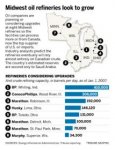- Joined
- Jan 25, 2012
- Messages
- 11,600
- Reaction score
- 1,344
- Location
- Georgia
- Gender
- Female
- Political Leaning
- Moderate
And yet your link is only to a liberal environmental group called Policy Innovations. Did you mistype the link or fail to put a link to Valero claiming what you think ??
I think, and I believe most Americans agree, that the more oil on the market, the better for all of us. Obama will be hammered on this for the next 10 months.
There won't be MORE oil.. This will be the same bitumen that was processed in out Mid West refineries.

